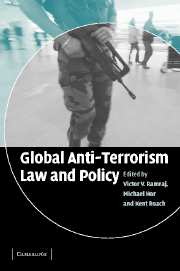Book contents
- Frontmatter
- Contents
- List of contributors
- Acknowledgements
- 1 Introduction
- PART ONE Theoretical Perspectives on Anti-Terrorism Law and Policy
- PART TWO A Comparative Study of Anti-Terrorism Measures
- 7 The criminal law and terrorism
- 8 And fairness for all? Asylum, national security and the rule of law
- 9 The financial war on terrorism
- 10 Terrorism and technology: policy challenges and current responses
- 11 Recent developments relating to terrorism and aviation security
- 12 International responses to combat maritime terrorism
- PART THREE Anti-Terrorism Law and Policy in Asia
- PART FOUR Regional Cooperation
- PART FIVE Anti-Terrorism Law and Policy in the West
- PART SIX Anti-Terrorism Measures in Africa, the Middle East and Argentina
- Index
8 - And fairness for all? Asylum, national security and the rule of law
Published online by Cambridge University Press: 21 July 2009
- Frontmatter
- Contents
- List of contributors
- Acknowledgements
- 1 Introduction
- PART ONE Theoretical Perspectives on Anti-Terrorism Law and Policy
- PART TWO A Comparative Study of Anti-Terrorism Measures
- 7 The criminal law and terrorism
- 8 And fairness for all? Asylum, national security and the rule of law
- 9 The financial war on terrorism
- 10 Terrorism and technology: policy challenges and current responses
- 11 Recent developments relating to terrorism and aviation security
- 12 International responses to combat maritime terrorism
- PART THREE Anti-Terrorism Law and Policy in Asia
- PART FOUR Regional Cooperation
- PART FIVE Anti-Terrorism Law and Policy in the West
- PART SIX Anti-Terrorism Measures in Africa, the Middle East and Argentina
- Index
Summary
Introduction
Asylum, immigration and nationality law have all been used in the ‘war against terrorism’ in, for example, the UK, the US and Canada. The heightened focus on these areas has highlighted the already draconian aspects of existing law and practice. Anti-terrorism law and policy is having a significant impact on refugees and asylum seekers. There is, however, no necessary connection between national security and asylum and what tends to be neglected is that refugee law was designed precisely to regulate the ‘exceptional situation’ of forced migration. The existence of the humanitarian institution of asylum need not raise security concerns and refugee law contains well-established mechanisms to address the issue. It is essential that the refugee regime does not become confused with, and undermined by, anti-terrorism law and policy.
Claims to the novelty of contemporary security concerns must be approached with caution. Refugee lawyers have noted for some time the ‘security discourse’ being constructed around the treatment of forced migration. In the UK, the government has woven migration policy into the narrative of providing security for citizens. In recent years concern about asylum has reached the highest political levels and extended beyond national contexts. The UN Security Council, for example, made clear after September 11 that there should be no safe havens for terrorists and that refugee status should not be ‘abused’ by ‘perpetrators, organizers or facilitators of terrorist acts’.
- Type
- Chapter
- Information
- Global Anti-Terrorism Law and Policy , pp. 152 - 178Publisher: Cambridge University PressPrint publication year: 2005
- 3
- Cited by



